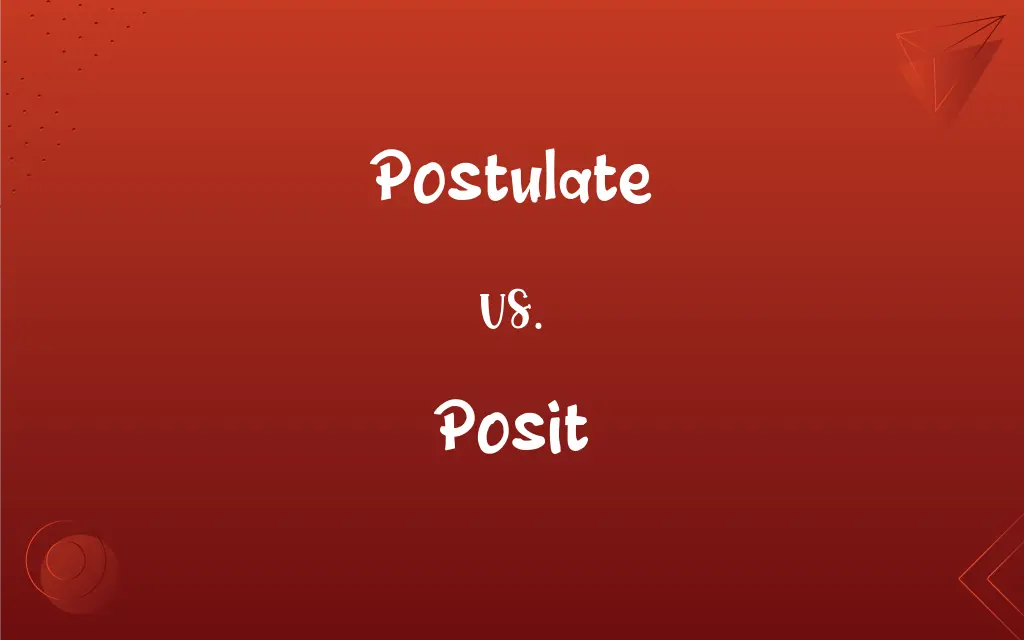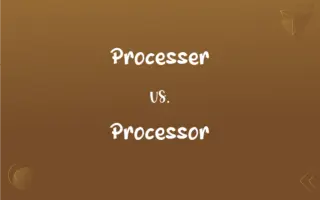Postulate vs. Posit: What's the Difference?
By Aimie Carlson & Janet White || Updated on May 23, 2024
Postulate is a fundamental assumption accepted without proof, often used in math and science, while posit means to assume or suggest something as a fact, typically in arguments or discussions.

Key Differences
Postulate is a term primarily used in mathematics and science, referring to a statement assumed to be true without proof as a basis for reasoning. For example, Euclid’s postulates form the foundation of geometry. Posit, on the other hand, is more broadly used in philosophy and discussions, meaning to assume or suggest a fact or principle, often as a basis for argument. While a postulate is an accepted starting point within a system, a posit can be a proposed idea meant to be explored or debated.
In scientific contexts, a postulate is essential as it forms the basis for developing theories and conducting experiments. These are taken to be self-evident and are not questioned within the system they support. Conversely, posit is used when introducing a hypothesis or assumption in discussions and is subject to examination and argument.
Postulates serve as foundational truths that underpin logical structures within specific fields. They are generally accepted by consensus within the scientific community. Whereas, posits are used to introduce new ideas or perspectives in various discussions, requiring validation through debate and evidence.
Postulates are rarely modified once established, as they form the bedrock of theoretical frameworks. They are fundamental to maintaining consistency within a discipline. Posits, however, can be flexible and often evolve as discussions and evidence progress, reflecting the dynamic nature of intellectual exploration.
Comparison Chart
Definition
A fundamental assumption accepted without proof
To assume or suggest a fact or principle
ADVERTISEMENT
Usage
Mathematics, science
Philosophy, discussions
Basis
Foundation of theories
Starting point for arguments
Acceptance
Generally accepted
Requires validation
Flexibility
Rarely modified
Flexible and evolving
Postulate and Posit Definitions
Postulate
An assumed fact used for reasoning.
Scientists often work with postulates in theoretical research.
ADVERTISEMENT
Posit
To assume or suggest as a fact or principle.
The researcher posited a new theory on climate change.
Postulate
A basic principle underlying a theory or system.
The theory postulates the existence of dark matter.
Posit
To assert or put forward as a basis of argument.
He posited that humans are inherently social beings.
Postulate
A proposition accepted as true for the sake of argument.
We can postulate that all swans are white for this experiment.
Posit
To put in place or position.
The philosopher posited the existence of a higher power.
Postulate
To assume or assert the truth, reality, or necessity of, especially as a basis of an argument
"We can see individuals, but we can't see providence.
We have to postulate it" (Aldous Huxley).
Posit
To propose an idea or hypothesis.
She posited that social media affects mental health.
Postulate
To propose as a hypothesis or explanation
Researchers now postulate that the disease is caused by a virus.
Posit
To affirm the existence of.
They posit the necessity of economic reform.
Postulate
To assume as a premise or axiom; take for granted.
Posit
To assume or put forward, as for consideration or the basis of argument
"If a book is hard going, it ought to be good. If it posits a complex moral situation, it ought to be even better" (Anthony Burgess).
Postulate
(Archaic) To make claim for; demand.
Posit
To place firmly in position.
Postulate
Something assumed without proof as being self-evident or generally accepted, especially when used as a basis for an argument
"the postulate that there is little moral difference between the superpowers" (Henry A. Kissinger).
Posit
Something that is posited; a postulate.
Postulate
A fundamental element; a basic principle.
Posit
(aviation) position
Postulate
(Mathematics) An axiom.
Posit
Assume the existence of; to postulate.
Postulate
(Archaic) A requirement; a prerequisite.
Posit
Propose for consideration or study; to suggest.
Postulate
Something assumed without proof as being self-evident or generally accepted, especially when used as a basis for an argument. Sometimes distinguished from axioms as being relevant to a particular science or context, rather than universally true, and following from other axioms rather than being an absolute assumption.
Posit
Put (something somewhere) firmly; to place or position.
Postulate
A fundamental element; a basic principle.
Posit
To dispose or set firmly or fixedly; to place or dispose in relation to other objects.
Postulate
(logic) An axiom.
Posit
To assume as real or conceded; as, to posit a principle.
Postulate
A requirement; a prerequisite.
Posit
(logic) a proposition that is accepted as true in order to provide a basis for logical reasoning
Postulate
Postulated.
Posit
Put (something somewhere) firmly;
She posited her hand on his shoulder
Deposit the suitcase on the bench
Fix your eyes on this spot
Postulate
To assume as a truthful or accurate premise or axiom, especially as a basis of an argument.
Posit
Put before;
I submit to you that the accused is guilty
Postulate
To appoint or request one's appointment to an ecclesiastical office.
Posit
Take as a given; assume as a postulate or axiom;
He posited three basic laws of nature
Postulate
To request, demand or claim for oneself.
Postulate
Something demanded or asserted; especially, a position or supposition assumed without proof, or one which is considered as self-evident; a truth to which assent may be demanded or challenged, without argument or evidence.
Postulate
The enunciation of a self-evident problem, in distinction from an axiom, which is the enunciation of a self-evident theorem.
The distinction between a postulate and an axiom lies in this, - that the latter is admitted to be self-evident, while the former may be agreed upon between two reasoners, and admitted by both, but not as proposition which it would be impossible to deny.
Postulate
Postulated.
Postulate
To beg, or assume without proof; as, to postulate conclusions.
Postulate
To take without express consent; to assume.
The Byzantine emperors appear to have . . . postulated a sort of paramount supremacy over this nation.
Postulate
To invite earnestly; to solicit.
Postulate
(logic) a proposition that is accepted as true in order to provide a basis for logical reasoning
Postulate
Maintain or assert;
He contended that Communism had no future
Postulate
Take as a given; assume as a postulate or axiom;
He posited three basic laws of nature
Postulate
Require as useful, just, or proper;
It takes nerve to do what she did
Success usually requires hard work
This job asks a lot of patience and skill
This position demands a lot of personal sacrifice
This dinner calls for a spectacular dessert
This intervention does not postulates a patient's consent
Postulate
A fundamental assumption accepted without proof.
Euclid's postulates are the basis of classical geometry.
Postulate
An axiom in mathematics.
The parallel postulate is crucial in Euclidean geometry.
FAQs
How is posit used in philosophy?
It is used to introduce an assumption or hypothesis as a basis for argument or exploration.
What is a postulate in mathematics?
A fundamental assumption accepted without proof to build a logical framework, such as Euclid's postulates in geometry.
Is a postulate the same as an axiom?
Yes, in many contexts, a postulate is synonymous with an axiom, both being fundamental assumptions.
Can a postulate be disproven?
No, postulates are assumed to be true within the system they support; they are not subject to proof or disproof.
Can posit be used in everyday language?
Yes, it can be used to suggest any idea or assumption, such as positing a new solution to a problem.
Are posits flexible?
Yes, posits can evolve and change with new evidence and arguments.
Do postulates require proof?
No, postulates are accepted without proof and used as starting points for reasoning.
How do posits differ from hypotheses?
Posits are suggested assumptions, while hypotheses are testable predictions.
Is positing only for formal discussions?
No, positing can be used in everyday conversations to introduce ideas or suggestions.
What is an example of a posit in a debate?
Suggesting that technology improves learning outcomes is an example of a posit in an educational debate.
Why are postulates important in science?
They provide foundational truths that theories and experiments are built upon.
How do mathematicians use postulates?
They use them as the starting points for proving other theorems and propositions.
What is a common postulate in physics?
The constancy of the speed of light in a vacuum is a fundamental postulate in Einstein's theory of relativity.
Can you give an example of positing in research?
A scientist posits that a certain chemical can cure a disease, leading to experimental testing.
Do postulates change over time?
Generally, they remain constant, as they form the foundational basis of a discipline.
How are postulates related to logical reasoning?
They provide the basic assumptions from which logical arguments and proofs are derived.
Can a posit be part of a theory?
Yes, posits often form the initial assumptions or ideas that lead to the development of theories.
Are postulates universally accepted?
Within a specific field, yes, but different fields may have different sets of postulates.
What happens if a posit is disproven?
It is revised or discarded, prompting further investigation and new posits.
What is a synonym for posit?
Suggest, propose, or hypothesize.
About Author
Written by
Aimie CarlsonAimie Carlson, holding a master's degree in English literature, is a fervent English language enthusiast. She lends her writing talents to Difference Wiki, a prominent website that specializes in comparisons, offering readers insightful analyses that both captivate and inform.
Co-written by
Janet WhiteJanet White has been an esteemed writer and blogger for Difference Wiki. Holding a Master's degree in Science and Medical Journalism from the prestigious Boston University, she has consistently demonstrated her expertise and passion for her field. When she's not immersed in her work, Janet relishes her time exercising, delving into a good book, and cherishing moments with friends and family.
































































